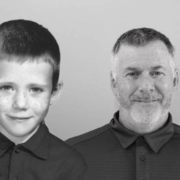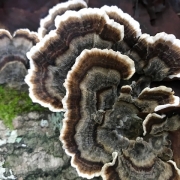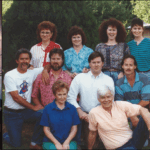If It Looks and Sounds Like a Duck | Healthy Aging Series: S11 E25
My name is Kimberly. I could have started with, “I am legend,” but that would have been a little presumptuous. Maybe, “I am a legend?”
But no, we’ll have to stay with the first proclamation. My name is Kimberly. You’re like, “So what?”
Try to imagine or be empathetic with an elementary or middle-school boy named Kimberly showing up for his first homeroom class of the 7th or 8th grade and hearing his name called out: Kimberly, Kimberly, Kimberly. Total embarrassment. A boy with a girl’s name.
I asked my parents why they gave their son, me, a girl’s name. “We wanted a girl!” (People have asked me that, and I tell them that I had seven (7) siblings prior to me. 3 girls and 4 boys; none of them had gender-problematic names.) Really, they said, “It was a beautiful name, and we didn’t know it would turn into a girl’s name.”
I got tired of hearing people say, “You don’t look like a Kimberly,” when I used my debit card. And, when a new client came for their first appointment, they were surprised that I wasn’t a female therapist. I got tired of it all and changed my name. I flipped my first and middle names. So, it went from Kimberly Mark Neese to, you know, Mark Kimberly Neese.
Through this process I realize how important names are and how we are all creatures of social conformity. We want to fit in. I didn’t want to be seen as different, and I wanted to be part of the social group. I didn’t want to stick out, you know, a boy with a girl’s name.
Food Fads
I think that the need to fit in has played a big part in our countries preponderance for following food fads. We’re food joiners. I googled current food fads and came up with:
Plant-based everything (South Park did a couple episodes on this).
Fermented food for good health, which includes kombucha.
Alternative milks made from soy, almonds and coconut.
Nonalcoholic drinks.
Food fads that include Keto, Paleo, and, yes, the Carnivore diets.
Intermittent Fasting or Time Restricted Eating.
Honestly, none of this is new. Later in the season, I’m going to share several additional nutritional revolutionaries.
Food Quackery
About 100 years ago there were 3 or 4 nutritionists and researchers (I use both of those terms loosely) that made waves, created fads and have been called quacks by modern food historians.
One of these nutritionists was Alfred W. McCann. Harvey Levenstein, in his book, “Paradox of Plenty: A Social History of Eating in Modern America,” referred to McCann as, “A pure food crusader and unabashed quack.”
Quack? I’m not so sure. Given the times, early 20th century, I would probably be a little more gracious about McCann.
McCann was a nutritional hobbyist. No credentials. But he looked around and saw the “pandemic” of a horrible food supply. Food industrialists were taking all of the vitamins and minerals out of food by ultraprocessing it. And so, he advocated for eating more natural food, or less processed food, like the advice of staying out of the inside aisles of a grocery store that we say today. McCann said eat your fruits and vegetables.
He said stay away from fish and meat because they were not fresh and likely putrid. He said, “Stay away from white bread!” He said lots and I mean lots of other things that probably got him into lots of trouble and lots of negative attention. He was a Christian Physiologist, meaning that there were rules, primarily from the Bible, that if followed, would prevent and even cure disease. I’ve oversimplified this but that’s the gist.
McCann went on a crusade against what he called the “Calorie Theory.” Why were we worried about calories when many high calorie, processed food, had no nutritional value, like sugar. It’s odd that McCann’s book, which I read, was entitled, “The Science of Eating,” when his religious beliefs along with antagonism towards scientists seemed to contradict his commitment to science, at least toward what the science community in his day asserted.
McCann, along with other nutritional hobbyists, warned their listeners about the disease of acidosis, which is an imbalance of acid in your blood. It was the fad of the day, bumping up against the practice of Quackery. Lots of nutritional apostles argued that it wasn’t enough to eat your fruits and vegetables, it was the order in which they were eaten. Acidosis is a real thing, but today we avoid it by simply eating leafy green vegetables. McCann was a crusader, and maybe he did practice a little quackery.
How do you spot a Quack?
Here are a couple of my thoughts:
First, Quacks typically present false dichotomies. It’s rarely, “one way or the other.” Who today would argue that calories don’t count. We might argue that our body responds differently to different macro-nutrients, carbs create a different metabolic response than proteins and fats. But still a calorie is a calorie. It’s never, “Eat your fruits and vegetables but don’t worry about portion control.” It’s both.
Second, I think McCann was a Trust Buster. That’s a sure sign of a duck. Do I believe everything I read when I use Google Scholar? Nope.
Is every doctor or health care provider immune from the siren calls of fame and fortune? Again, no.
But I trust most of the research I read. I don’t agree with all of it but most research is not paid for and biased by the producer of the thing being researched. Call me naive, and maybe I am, but I trust most of the studies by: NIH, NIMH, CDC, and the multiple government websites. And I trust my doctor even though she’s a Physician Assistant. She’s great!!!
Third, McCann gave too much credibility to anecdotal evidence. I don’t discount anecdotal observations, but I weigh them against causal and even epidemiological studies, even though epidemiological studies are a large-scale anecdotal study, mostly. See the China study that suggests a vegetarian diet is preferred over an omnivore diet. It’s an epidemiological study and doesn’t carry the weight of a causal study.
Fourth, mixing science with anything else, including religion and politics, is often the sign of Quackery. I don’t hear a lot of Christian Physiology today. There are still people that practice faith healing but still pretty fringe stuff. Politics seems to be the Fad DuJour in the nutrition world. We see it when political leaders suggest that additives, eating guidelines, and regulatory guidelines represent a political bias, i.e. homogenized milk, vaccines, and food dyes. I suspect you would be on the pro or con side depending on which political party you belong to. Maybe not. I think religion and politics should stay out of our nutritional decision-making process.
Those are some of my thoughts of McCann and his quackery. So, what’s a person to do? How do you recognize Nutritional Quackery? I know what I’m going to say will ruffle a few feathers in the Duck community but, as Jimmy from South Park would say, “I mean, come on!” Read the dietary guidelines from myplate.gov. In a nutshell here’s what it says:
My plate.gov eating guideline:
- Eat lots of fruits and vegetables, two cups of fruits, and two cups of vegetables per day.
- Eat whole grains, 6 oz a day.
- Drink low-fat milk, yogurt, and/or cheese, 3 cups a day.
- Eat 60 grams of lean protein per day.
- Limit your intake of refined sugar and ultra-processed foods.
NIH Exercise Guidelines:
Workout 150 minutes of moderate exercise per week or 75 minutes per week of vigorous exercise. This should include both resistance and cardio training.
NIH Sleep Guidelines:
7-9 hours of sleep per night.
It’s easy to get confused nowadays. Go to any bookstore and there are thousands of books and hundreds of different diets. Also, there is an abundance of processed foods everywhere we go. Try walking into a convenience store and find something that is not processed or not a refined carbohydrate. Maybe nuts, and maybe jerky, but that’s about it.
There are really good nutritional books out there, and most of them agree with the National Institute of health guidelines. I practice the time restricted eating, and I tend to reduce carbohydrates when I’m wanting to lose weight, and I do my best to avoid refined sugar. But over the past 10 years I’ve made it my practice to avoid Food Quackery.
This means steering clear of fad diets, miracle supplements, or any sweeping claims that promise effortless health transformations. Instead, I’ve learned to cherish the basics: whole foods, balanced meals, sustainable habits, and a healthy dose of skepticism toward anything that sounds too good to be true. Nutrition, like most things worthwhile, is about consistency and balance—not extremes or shortcuts.
If anyone says otherwise, then, “They’re a Duck.”













